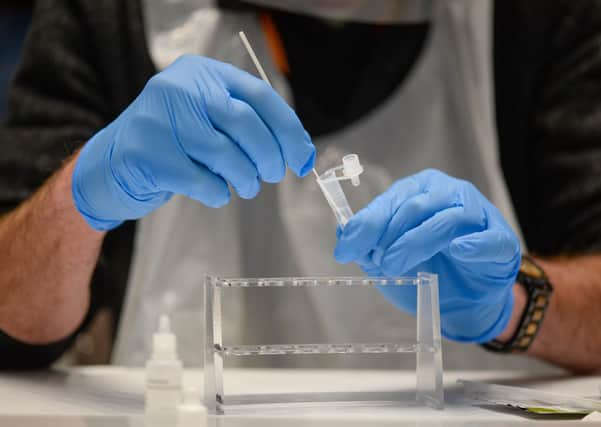Covid testing rate soars in Brighton and Hove


Alistair Hill, the director of public health in Brighton and Hove, said that this was good because those people could self-isolate and break “the chain of transmission”.
Mr Hill said that the extra testing had contributed to the rise in the number of new cases being reported.
Advertisement
Hide AdAdvertisement
Hide AdThe upside was that public health officials had a clearer picture of infection rates while people who had the virus but who were without symptoms were now less likely to infect others.
About 70 per cent of those taking the rapid tests – known as lateral flow tests – were school children, he said, as part of the drive to get students safely back into classrooms.
Mr Hill praised schools and colleges for what they had achieved since ramping up the number of tests at the start of the month – but he also had a warning.
He said that people should not ignore the rules around social distancing even if they tested negative for covid-19.
Advertisement
Hide AdAdvertisement
Hide AdMr Hill did not say how many asymptomatic cases had been identified as a result of the ramped up testing regime.
But in the seven days to Thursday March 18, there were 103 positive tests in Brighton and Hove – a rate of 35.4 cases for every 100,000 people.
The figures included lateral flow tests as well as the slower but more reliable PCR (polymerase chain reaction) tests.
And in the seven days to Wednesday March 17, about a thousand people a day – or 7,246 in total – with symptoms had PCR tests.
Advertisement
Hide AdAdvertisement
Hide AdSince the end of September, the lowest number of positive tests registered in Brighton and Hove was 26.8 cases for every 100,000 people in the seven days to Wednesday March 10.
The current rate of new coronavirus cases is below the average for England.
The figures were reported to a virtual meeting of Brighton and Hove City Council’s Health and Wellbeing Board on Tuesday (March 23).
The board includes councillors, representatives of the Brighton and Hove Clinical Commissioning Group (CCG) and Healthwatch Brighton and Hove.
Advertisement
Hide AdAdvertisement
Hide AdMr Hill said: “I don’t think there is any room for complacency on the pathway we are on. Every stage of the government’s road map is going to increase social mixing and potentially increases the risk of transmission.
“Social distancing and all of the remaining restrictions are absolutely vital. Just because some of the things are changing does not mean we should drop all of the restrictions. They are as important as they ever were.”
He said that Brighton and Hove was a challenging place when it came to tackling new variants of the virus for a variety of reasons.
These included the nature of Brighton and Hove as a tourist destination, student centre, an important health hub with a teaching hospital – and somewhere with housing problems and a significant homeless population.
Advertisement
Hide AdAdvertisement
Hide AdThe deputy managing director Brighton and Hove CCG Ashley Scarff said that 24 people with covid-19 were being treated at the Royal Sussex County Hospital, in Brighton. Three were in critical care beds and the other 21 were in general beds.
The number was less than a fifth of the total in February and a tenth of the number in January when cases peaked.
Mr Scarff said that everyone over 70 and all frontline health staff, social care workers, care home staff and the clinically extremely vulnerable had been offered vaccinations.
A mobile vaccination service in an ambulance was touring Brighton and Hove – and a publicity campaign was running, with the message: “No one is safe until we are all safe.”
Advertisement
Hide AdAdvertisement
Hide AdThe CCG was focusing on vaccinating the top nine priority groups, Mr Scarff said, including the over 50s and people at risk. It expected to achieve this by mid-April.
He said that there were enough vaccine supplies to cover a first dose for the remaining priority groups as well as those awaiting their second jabs.
And he added that a million people across Sussex were expected to have been vaccinated by the weekend.